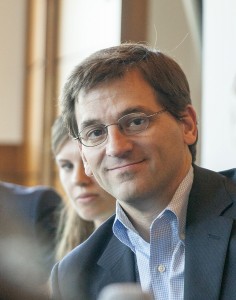Panelists examine policy in the Middle East
For the final “Students Talk Back,” forum of the semester, hosted by the Jesse M. Unruh Institute of Politics and the Schwarzenegger Institute, panelists discussed the United States’ policy toward the Middle East.

International relations · Peter Baker, White House correspondent for The New York Times, discusses his views on U.S. foreign policy. – Ralf Cheung | Daily Trojan
The panelists included Peter Baker, White House correspondent for The New York Times and author of Days of Fire: Bush and Cheney in the White House; Terry McCarthy, president and CEO of the Los Angeles World Affairs Council and Annalise Mantz, editor-in-chief of the Daily Trojan. Dan Schnur, director of the Unruh Institute, and Yasmeen Serhan, co-online editor of the Daily Trojan served as moderators of the event.
Baker, Mantz and McCarthy analyzed the situation from different angles: Baker from the point of view of the Bush’s relationship with Cheney, Mantz from public opinion and polling and McCarthy from a political theory perspective. All three panelists agreed, however, that the United States is tired of war in the Middle East.
Mantz cited a CNN poll in which seven in 10 Americans said they believed that a strike in Syria would not advance U.S. goals. Another poll reported that 53 percent of Americans are opposed to the Iraq War.
Baker argued that though these negative opinions toward military involvement have had a large effect on Obama’s presence in Syria, public opinion in fact had a different impact on the Bush-Cheney intervention into Iraq, turning the war in to one of principle rather than one of politics.
“He looked at the low [polling] numbers he had as a badge of honor,” Baker said.
McCarthy approached many of his arguments from a theoretical perspective.
“The bigger problem we have is: What is America’s role in the Middle East and how unilateral can it be?” McCarthy asked.
McCarthy said Putin’s role in the Syria conflict helped to end unilateral intervention into the Middle East.
McCarthy also argued for the need for self-determination, wherever that might lead, for the Middle East despite the fact that he believes that this path will be a destructive one.
“It’s unclear to me whether Syria even remains a country,” he said.
Citing its history and its shift from power in dictatorship to power in the people, McCarthy pointed out that Syria is an artificial country designed by the French, and that conflict there was inevitable.
Though the discussion principally remained on the topic of the Middle East, Baker discussed his book, which discusses the entire Bush administration, not just Iraq. He cited differences in leadership styles with an anecdote concerning Bush, and one concerning Obama. When both of them dealt with leaks in their administrations, Obama said he was disappointed, but Bush threatened to fire potential leakers.
“It’s the mom approach and the dad approach,” Baker said, pointing out that neither method is right or wrong. “Mom is disappointed. Dad is just going to fire your a–. It is a different approach and it’s tough love in two different ways.”
When the forum opened up to the audience for questions, Denise Ge, a senior majoring in international relations (global business) asked McCarthy about unilateralism in Middle Eastern public policy. Though McCarthy said he believes that intervention will be multilateral and done through the United Nations, he also believes that an attempted military strike will be done unilaterally.
When interviewed after the discussion, Ge expressed support for the forum.
“[The forum] kind of cast a different light on the story that we read every day,” Ge said. “Students are often very unaware of what is happening in the world.”
On the other hand, Ge had hoped there would be more discussion about the humanitarian implications of the Arab Spring.
Other students said they were more concerned with the relationship between Bush and Cheney that was explored during the event. According to the event’s speakers, the initial push for war came from Cheney but the second term found Bush relying more on his other advisers.
“It was interesting to see how Bush changed from first term to second term and how his disconnect [with Cheney] expanded and grew,” said Chris Lee, a senior majoring in international relations and economics.
Whitney Davis, a graduate student studying electrical engineering, also enjoyed learning more about the former president.
“I really enjoyed Peter [Baker’s] background knowledge of the Bush and Cheney relationship. That was something I was not aware of growing up during that time.”
Follow us on Twitter @dailytrojan
